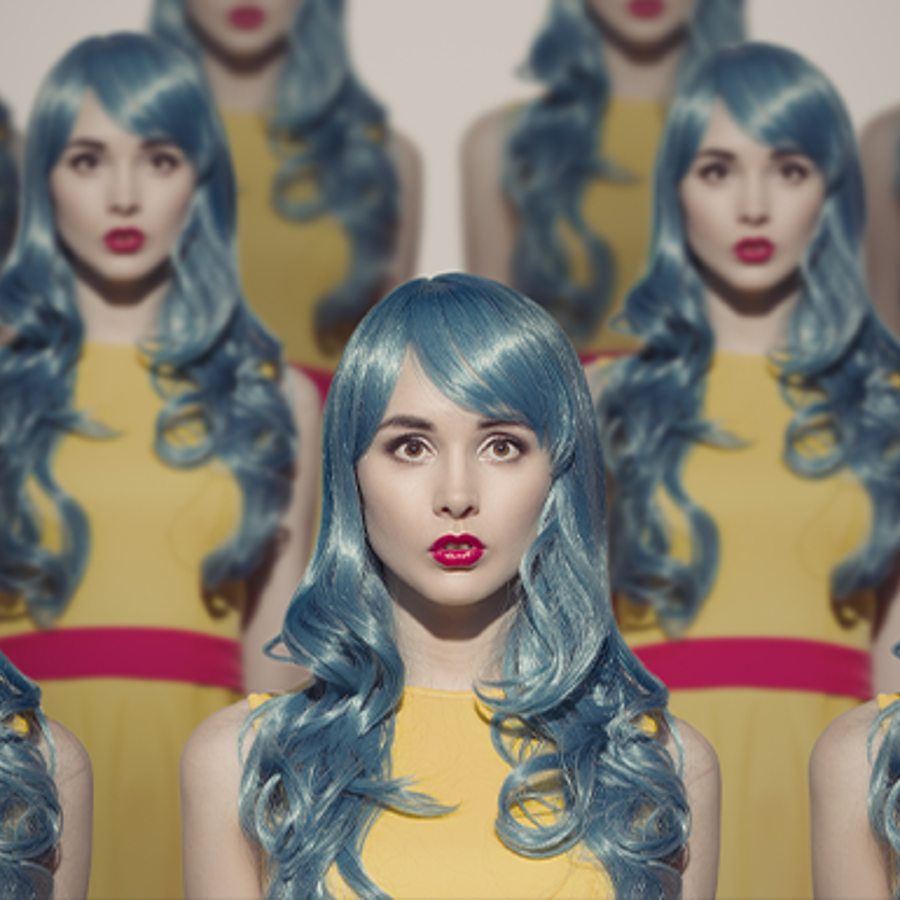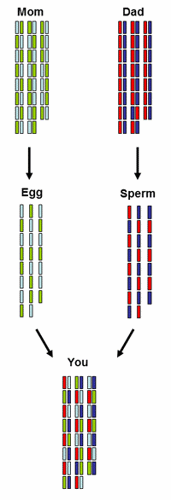
What would happen if people with the same DNA have a child?
March 28, 2012

- Related Topics:
- Quirky questions,
- Futuristic science,
- Recombination,
- Reproduction,
- Cloning,
- Intermarriage
A curious adult from Great Britain asks:
"If people with the same DNA have a child, will it be a clone or will the child be deformed in some way (like in incest)? For instance, what if a sperm and an egg have the same DNA?"
What an interesting question! The scenario you're asking about can't happen naturally in people. It might happen one day in the lab, but it wouldn't be easy…
For example, you couldn't just fuse two egg cells or two sperm cells together to get a child whose DNA is all from one parent. To make a healthy child, you need DNA that has been made in a sperm and DNA that has been made in an egg. An embryo just can't develop with just one kind of DNA, even if there is enough of it.
But one way we might be able to pull this off is by using stem cells. These are the cells we all start out with that can become any other kind of cell.
Stem cells originally come from embryos. However, scientists have now figured out how to take someone's skin cells and turn them back into stem cells.
We could take some of those stem cells, and turn some of them into sperm and turn the rest into eggs. Then we'd fuse the two together to get a fertilized egg.
This should work in theory. In fact, scientists have managed to get sperm cells from embryonic stem cells in mice. So this kind of thing might be possible one day.
Since each egg or sperm a person makes is different, the kids they make will be unique too.
But we don't know how healthy that child would be. We can guess, though, that the child may suffer from many of the same problems as children of incest. The child would be much more likely to end up with certain genetic diseases.
One thing we do know for sure is that the child would not be a clone. This may seem weird - if the child has the same DNA, why isn't it a clone?
Because the child has only some of their parents’ DNA… some of it gets swapped and lost in the making of the sperm and egg.
Parents Pass Half Their DNA
When eggs and sperm are made, each parent's DNA has to be divided up. Otherwise, each generation would have more DNA than the last one!
This DNA comes in packages called chromosomes. Most cells in the body have 23 pairs of chromosomes, for 46 total. One in each pair comes from mom and one comes from dad.
The egg and sperm are different, though. They each have only one chromosome from each pair. That's half the normal number of chromosomes (23).
This is so that when the sperm fertilizes the egg, the baby ends up with the right number of chromosomes (23 + 23 = 46). You can see how this works in the example below:


So can parents choose which chromosomes they pass on to their kids? Of course not!
Chromosomes are sorted randomly into eggs and sperm. The technical term for this is independent assortment. When you sort all 23 pairs randomly, you end up with 8,388,608 possible different eggs or sperm from one person!
And this is actually a huge underestimate of the number of possibilities. There’s actually close to an infinite number of possible eggs or sperm from one person.
This is because the chromosomes also swap pieces with each other before getting put into an egg or sperm (keep reading for more details).
Since each egg and sperm is different, the kids they make will be unique too. That's why brothers and sisters aren't exactly alike: they each get a different combination of their parents' DNA.
Not a Clone
So in the example above, we saw how chromosomes are inherited from both parents. Let's look at what would happen if both the egg and the sperm are created from the same parent.
Out of each blue/green pair, sometimes both the egg and sperm will get a blue chromosome. Other times the egg will get the green and the sperm will get the blue, or vice versa.


If you compare the child's chromosomes to the parent's, you'll see that all of the parent's chromosomes are in green/blue pairs. The child, however, has some blue/blue pairs and some green/green pairs, as well as green/blue pairs. This means that the child is not a clone!
And it’s actually even more complicated than this. When eggs and sperm are formed, the chromosome pairs line up so that one in each pair can be sorted into the egg or sperm. During that pairing process, the chromosomes swap pieces.
This swapping process is called recombination. Because of recombination, each egg or sperm will be unique! This is what it could look like in a child if the egg and sperm came from the same parent:


Impact of Doubling One Parent's Genes
So we've seen that if the egg and sperm are from the same parent, the child would not be a clone. Unfortunately the child would most likely be sick though.
We all carry between 5 and 10 hidden disease genes in our DNA. These genes only become a problem if both parents pass the same disease gene to their children. This is how people can end up with cystic fibrosis or sickle cell anemia even if their parents do not have either disease.
Luckily for all of us, people tend to have different hidden disease genes. This means that the odds are very low that a child will end up with one of these diseases.
The odds go up, though, if the parents are related. Related parents are more likely to share these hidden disease genes, making their children more likely to have a genetic disease.
And this would really be a problem if the sperm and egg came from the same parent! This parent will for sure have the same set of hidden disease genes.
Because of how genes are passed on, this means that each child would have a 25% chance of having each disease. So the child would have a 25% chance for having disease 1, a 25% chance of having disease 2, and so on. Odds are the child will end up with at least one disease!
And this isn't just theory. There are cases where a child happens to get two of the same copies of a chromosome from one parent (click here to learn more about this). These kids get genetic diseases more often than do kids who get a chromosome from each parent.
So even if we could make eggs and sperm from the same parent, it probably wouldn't turn out well for the child. And it certainly would not be a clone!

Author: Dr. Susan Roehl White
When this answer was published in 2012, Susan was a post-doctoral fellow in the Department of Molecular and Cellular Physiology, studying protein trafficking to primary cilia in Maxene Nachury's laboratory. Susan wrote this answer while participating in the Stanford at The Tech program.
 Skip Navigation
Skip Navigation
